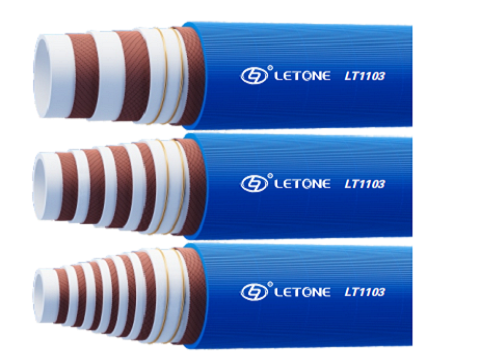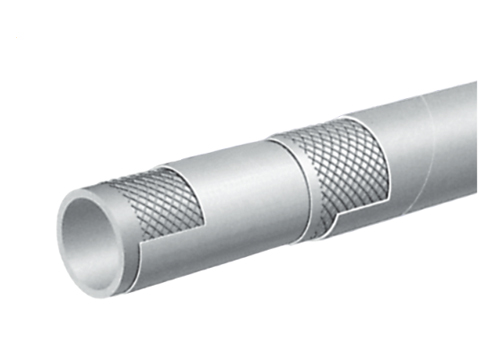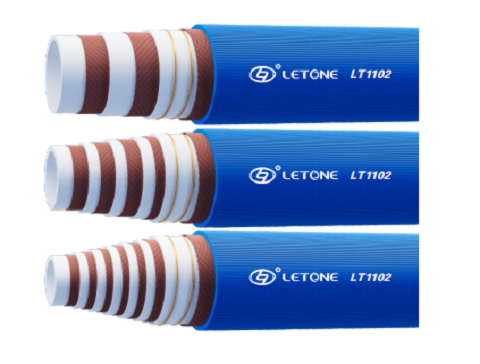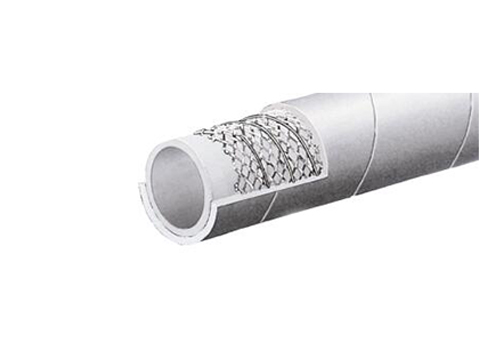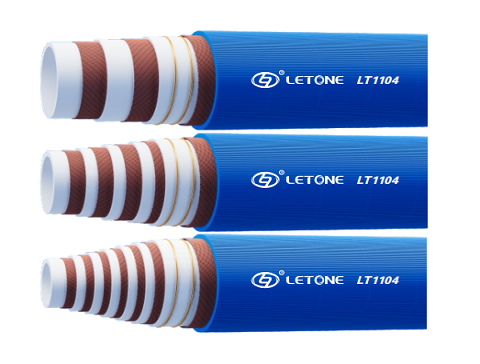In the modern industrial field, the demand for fuel hoses and connecting pipes is constantly increasing in the shipbuilding and chemical industries. As key transportation channels, these pipelines play an important role in ensuring the safety and efficiency of fuel and chemical product transportation. This article will delve into various aspects of fuel hoses, marine flange oil unloading hoses, union connecting pipes, and chemical pipelines, providing readers with comprehensive and detailed guidance.
1、 Application and selection of fuel hoses
1.1 Key role of fuel hose
Fuel hoses are used to transport fuel from storage tanks to engines or other equipment. In ship applications, the performance of hoses directly affects the safe transportation of fuel. In addition, high-quality hoses also need to have chemical corrosion resistance, wear resistance, and compression resistance to cope with complex usage environments.
1.2 Key factors for selecting fuel hoses
 -Material durability: The hose material must have the characteristics of oil resistance, corrosion resistance, and wear resistance. Common materials include polytetrafluoroethylene rubber (PTFE), chloroprene rubber, etc.
-Temperature adaptability: Select the appropriate hose according to the temperature requirements of the usage environment to ensure normal operation even under extreme temperatures.
-Installation flexibility: The design of fuel hoses should facilitate quick installation and replacement, reducing maintenance time.
2、 Unique performance of marine flange oil unloading hose
2.1 Characteristics of marine flange oil unloading hose
This type of hose is specifically designed for ships as it needs to withstand enormous pressure and loads. The flange connection method ensures reliable connection and is not prone to leakage. Rubber hoses are usually composed of multiple layers of structure, providing high pressure resistance and tensile strength.
2.2 Precautions for deploying flange oil unloading hoses for ships
-Flange quality: Choose high-quality flange materials such as stainless steel to ensure that long-term use will not cause leakage due to rust or deformation.
-Correct installation: Ensuring that the flange bolts are securely fastened and regularly inspected and maintained is key to safe use.
-Regular testing: Conduct stress tests and physical inspections regularly to identify potential issues in advance.
3、 Application and Optimization of Large Diameter Oil Union Connecting Pipe
3.1 Understanding Large Diameter Oil Union Connecting Pipe
Oil union is an important equipment in oil fields and other industrial settings, suitable for systems that require processing large amounts of fluids. Large caliber oil hose connections are commonly used for high flow and long-distance transmission.
3.2 Optimization Strategies in Applications
-Fluid dynamics design: Ensure that the inner diameter of the pipeline matches the fluid properties and reduces flow resistance.
-Connection technology: Advanced welding or sealing techniques are used to reduce connection failures.
-Material upgrade: Prioritize the use of higher quality and more durable alloy materials to manufacture pipelines.
4、 Safety and environmental considerations for chemical pipelines
4.1 Safety standards that must be taken seriously
Chemical pipelines are commonly used for transporting various corrosive chemicals, and their design must strictly comply with relevant safety standards, such as the ASME B31.3 chemical pipeline standard. Pipeline materials need to have high corrosion resistance, such as stainless steel, PVC, or polypropylene.
4.2 Environmental Protection Requirements and Solutions
-Anti leakage design: Apply composite material lining and design anti leakage system in advance to protect the environment.
-Waste disposal: Ensure that the pipeline system design takes into account the management of waste and residual liquid to prevent chemical pollution.
-Sustainable equipment: using renewable materials to reduce long-term environmental impact.
5、 Summary and Future Development Trends
5.1 Overview
Fuel hoses, marine flange unloading hoses, large-diameter union connecting pipes, and chemical pipelines not only play an indispensable role in industrial systems, but also face constantly upgrading and changing demands under strict safety and environmental standards.
5.2 Future Development Direction
-Intelligent monitoring: In the future, more intelligent monitoring devices will be introduced into pipeline systems to monitor usage status in real-time, greatly improving safety.
-Application of new materials: With the advancement of technology, the application of lightweight and high-strength new materials will greatly extend the service life of equipment and reduce maintenance costs.
-Environmental Protection Enhancement: Stricter regulations will encourage companies to pay more attention to environmental standards when selecting and using pipelines.
Through detailed analysis of these fields, industry professionals can better select and manage relevant pipeline equipment to ensure long-term efficient and safe operation of the system.
-Material durability: The hose material must have the characteristics of oil resistance, corrosion resistance, and wear resistance. Common materials include polytetrafluoroethylene rubber (PTFE), chloroprene rubber, etc.
-Temperature adaptability: Select the appropriate hose according to the temperature requirements of the usage environment to ensure normal operation even under extreme temperatures.
-Installation flexibility: The design of fuel hoses should facilitate quick installation and replacement, reducing maintenance time.
2、 Unique performance of marine flange oil unloading hose
2.1 Characteristics of marine flange oil unloading hose
This type of hose is specifically designed for ships as it needs to withstand enormous pressure and loads. The flange connection method ensures reliable connection and is not prone to leakage. Rubber hoses are usually composed of multiple layers of structure, providing high pressure resistance and tensile strength.
2.2 Precautions for deploying flange oil unloading hoses for ships
-Flange quality: Choose high-quality flange materials such as stainless steel to ensure that long-term use will not cause leakage due to rust or deformation.
-Correct installation: Ensuring that the flange bolts are securely fastened and regularly inspected and maintained is key to safe use.
-Regular testing: Conduct stress tests and physical inspections regularly to identify potential issues in advance.
3、 Application and Optimization of Large Diameter Oil Union Connecting Pipe
3.1 Understanding Large Diameter Oil Union Connecting Pipe
Oil union is an important equipment in oil fields and other industrial settings, suitable for systems that require processing large amounts of fluids. Large caliber oil hose connections are commonly used for high flow and long-distance transmission.
3.2 Optimization Strategies in Applications
-Fluid dynamics design: Ensure that the inner diameter of the pipeline matches the fluid properties and reduces flow resistance.
-Connection technology: Advanced welding or sealing techniques are used to reduce connection failures.
-Material upgrade: Prioritize the use of higher quality and more durable alloy materials to manufacture pipelines.
4、 Safety and environmental considerations for chemical pipelines
4.1 Safety standards that must be taken seriously
Chemical pipelines are commonly used for transporting various corrosive chemicals, and their design must strictly comply with relevant safety standards, such as the ASME B31.3 chemical pipeline standard. Pipeline materials need to have high corrosion resistance, such as stainless steel, PVC, or polypropylene.
4.2 Environmental Protection Requirements and Solutions
-Anti leakage design: Apply composite material lining and design anti leakage system in advance to protect the environment.
-Waste disposal: Ensure that the pipeline system design takes into account the management of waste and residual liquid to prevent chemical pollution.
-Sustainable equipment: using renewable materials to reduce long-term environmental impact.
5、 Summary and Future Development Trends
5.1 Overview
Fuel hoses, marine flange unloading hoses, large-diameter union connecting pipes, and chemical pipelines not only play an indispensable role in industrial systems, but also face constantly upgrading and changing demands under strict safety and environmental standards.
5.2 Future Development Direction
-Intelligent monitoring: In the future, more intelligent monitoring devices will be introduced into pipeline systems to monitor usage status in real-time, greatly improving safety.
-Application of new materials: With the advancement of technology, the application of lightweight and high-strength new materials will greatly extend the service life of equipment and reduce maintenance costs.
-Environmental Protection Enhancement: Stricter regulations will encourage companies to pay more attention to environmental standards when selecting and using pipelines.
Through detailed analysis of these fields, industry professionals can better select and manage relevant pipeline equipment to ensure long-term efficient and safe operation of the system.

